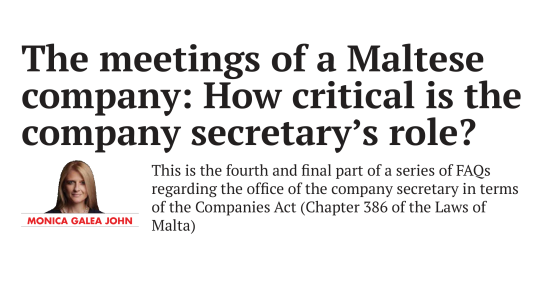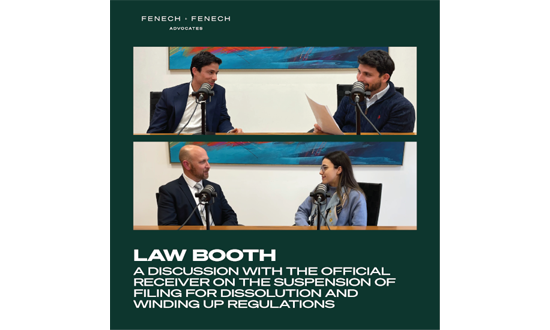
These FAQs consider the procedure and requirements in terms of the Companies Act (Chapter 386 of the Laws of Malta) concerning increases in company share capital.
How is an increase in company share capital regulated under Maltese law?
The procedure by which the share capital in respect of a Maltese-registered company can be increased is effectively governed by the Companies Act (Chapter 386 of the Laws of Malta) as supplemented by the Memorandum and Articles of Association (the “M&As”) of a company.
Who is empowered to authorise an increase in the share capital of a company?
In terms of the Companies Act, an increase in company share capital requires approval by means of an ordinary resolution of the shareholders unless the M&As of a company stipulate any higher percentage than that required for an ordinary resolution (e.g. an extraordinary resolution).
In addition, provided the M&As expressly permit, the general meeting may give authority by ordinary resolution, to the Board of Directors, to issue shares up to a maximum specified amount, which authorisation shall be valid for 5 years, renewable for further periods of 5 years each.
Where a company has more than one class of shares, the shareholders’ resolution governing the increase in the issued share capital or the directors’ authorisation to issue shares, shall be subject to a separate vote for each class of shareholders whose rights are affected by that resolution or authorisation, and the same majorities shall apply for each class.
Is it necessary to amend the M&As upon an increase to the company’s share capital?
This depends on whether it is the authorised or solely the issued share capital that is being increased.
An increase in the authorised share capital of a company necessarily requires an amendment to the share capital clause of the Memorandum. On the other hand, no such requirement extends to an increase in the issued share capital by itself.
It is worthy to note that since shares can only be issued up to the amount stated in the authorised share capital clause, unless the amount of the company’s authorised share capital at the time of the share issue sufficiently caters for the amount of new shares proposed to be issued, the authorised share capital would necessarily need to be increased to allow for new shares to be issued, which would in turn necessitate an amendment to the Memorandum of the Company.
Against what consideration may new shares be issued, and how are such new shares allotted?
The consideration for the acquisition of shares upon a new share issue must consist of assets capable of economic assessment, and it is against a consideration in cash or in kind that newly issued shares can be allotted.
In the case of an allotment in cash, a bank slip must be provided evidencing (i) the deposit of the total amount by which the issued share capital of the company is to be increased, (ii) the date of receipt of the funds and (iii) the details of the company qua receiver of the funds.
In the case of an allotment in kind, a report on the consideration is required to be drawn up by an expert who is independent of the company and approved by the Registrar (e.g. an auditor / audit firm holding a local warrant) before the new shares are issued.
In addition, some form of documentation evidencing the title of the allottee to the allotment is also required, together with any contract of sale or services rendered in respect of which the allotment in kind is being made (e.g. a contribution agreement).
How does the law distinguish between public and private companies with respect to the issue and allotment of new shares?
Upon an allotment, shares shall be paid up to at least 25% of their nominal value in the case of a public company, and at least 20% of their nominal value in the case of a private company.
Moreover, in the event that shares of a public company are proposed to be allotted for a consideration in cash, such shares shall be offered to shareholders on a pre-emptive basis in proportion to the share capital held by them, provided however, that shares in any company, whether public or private, shall not be offered on a pre-emptive basis to the company itself, notwithstanding any other provision of the Companies Act empowering a company to hold its own shares.
What documentation is required to be submitted to the Malta Business Registry (the “MBR”) for the purposes of a share capital increase?Subject to their prior submission to the International Corporate and Tax Unit, the following documents are to be submitted to the MBR:
- Ordinary resolution of the shareholders (unless the M&As require any higher percentage);
- Statutory Form H (notice of return of allotments);
- Statutory Form BO(2) (notice of change of beneficial ownership);
- Bank slip, in the case of an allotment in cash;
- Expert’s report, in the case of allotment in kind;
- Contract in writing or a document constituting the title of the allottee to the allotment, in the case of allotment in kind;
- If the transferee is a new shareholder, supporting due diligence documentation pertaining to such person (which varies according to whether the new shareholder is a natural or legal person and whether of EU or non-EU nationality).
Moreover, where a new issue of shares necessitates an increase to the authorised share capital, an extraordinary resolution of the shareholders authorising a change to the Memorandum of the Company and a revised set of M&As would need to be submitted to the MBR as a first step.
Besides the documentation to be submitted to the MBR, what other steps / documents are required to be completed by a company upon the issue and allotment of new shares?
- The register of members is to be updated to reflect the issue of the new shares;
- A new share certificate is to be issued in the name of the person holding the newly issued shares;
- If applicable, the register of beneficial owners is to be updated to reflect any changes to the company’s beneficial ownership as a result of the share issue.
For assistance in connection with share capital increases, please contact Dr. Sarah Grima on sarah.grima@fenechlaw.com
©Fenech & Fenech Advocates
Disclaimer │ The information provided on this Update does not, and is not intended to, constitute legal advice. All information, content, and materials available are for general informational purposes only. This Update may not constitute the most up-to-date legal or other information and you are advised to seek updated advice.















